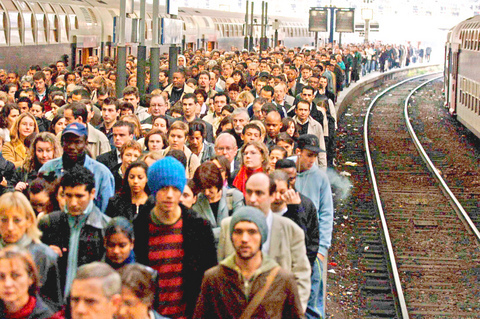A nationwide one-day strike gripped France yesterday, spreading transport woes and dealing Prime Minister Dominique de Villepin his first major test in implementing labor and economic reforms.
In the capital only around a third of suburban train services were running, and there were some cancelations on the bus and metro system -- but overall there was less disruption than expected.
The capital's transport authority last year put in place a system of "guaranteed service" in case of strikes, which appeared to be working.

PHOTO: EPA
France's civil aviation authority predicted that 175 short and medium-haul flights would be canceled from Orly airport south of Paris and 212 from Roissy Charles de Gaulle. No disruptions were expected on long-haul flights.
The situation was worse in other cities such as Marseille and Bordeaux, however, where most public transport was out of action.
The SNCF national rail company said that 40 percent of regional services were up and running as well as 60 percent of high-speed TGV intercity lines.
As well as transport workers, around half of teachers were also striking, and most post offices and government buildings and some banks remained shut. Most national newspapers failed to appear.
Five of the country's biggest trade unions called the stoppage to protest policies Villepin's center-right government has brought in to invigorate France's sluggish economy and to push for public sector pay rises.
Demonstrations were planned in more than 140 towns and cities, with the largest leaving the Place de la Republique in Paris during the afternoon.
The unions behind the day of action were boosted by a poll showing they have the support of most of the French, who have already showed their dissatisfaction with President Jacques Chirac by rejecting a referendum in May to adopt a European constitution.
Villepin, 51, a suave and popular politician who gained an international profile during his time as foreign minister during the build-up to the Iraq War, was named by Chirac to lead the government following the referendum's failure.
Given the tough task of reducing 10-percent unemployment, he soon earned criticism from unions and left-wing parties for pushing through by decree a series of measures designed to make France's sclerotic labor market more flexible.
One of those -- a new job contract which gives small businesses a freer hand to hire and fire -- is the focus of much of the protesters' ire amid fears that it might bring an end to France's job-for-life culture.
The strike comes at a sensitive time for Villepin, who has been rocked onto the back foot by a crisis over the privatization of the state-owned SNCM ferry company serving Corsica and north Africa from ports on the Mediterranean coast.
Plans to sell off the heavily-indebted concern sparked days of violence in Corsica, a near-blockade of the island, and the shut-down of France's largest port of Marseille. Though action was taken over the weekend to re-open communications, the situation remained highly volatile.

Kehinde Sanni spends his days smoothing out dents and repainting scratched bumpers in a modest autobody shop in Lagos. He has never left Nigeria, yet he speaks glowingly of Burkina Faso military leader Ibrahim Traore. “Nigeria needs someone like Ibrahim Traore of Burkina Faso. He is doing well for his country,” Sanni said. His admiration is shaped by a steady stream of viral videos, memes and social media posts — many misleading or outright false — portraying Traore as a fearless reformer who defied Western powers and reclaimed his country’s dignity. The Burkinabe strongman swept into power following a coup in September 2022

‘FRAGMENTING’: British politics have for a long time been dominated by the Labor Party and the Tories, but polls suggest that Reform now poses a significant challenge Hard-right upstarts Reform UK snatched a parliamentary seat from British Prime Minister Keir Starmer’s Labor Party yesterday in local elections that dealt a blow to the UK’s two establishment parties. Reform, led by anti-immigrant firebrand Nigel Farage, won the by-election in Runcorn and Helsby in northwest England by just six votes, as it picked up gains in other localities, including one mayoralty. The group’s strong showing continues momentum it built up at last year’s general election and appears to confirm a trend that the UK is entering an era of multi-party politics. “For the movement, for the party it’s a very, very big

ENTERTAINMENT: Rio officials have a history of organizing massive concerts on Copacabana Beach, with Madonna’s show drawing about 1.6 million fans last year Lady Gaga on Saturday night gave a free concert in front of 2 million fans who poured onto Copacabana Beach in Rio de Janeiro for the biggest show of her career. “Tonight, we’re making history... Thank you for making history with me,” Lady Gaga told a screaming crowd. The Mother Monster, as she is known, started the show at about 10:10pm local time with her 2011 song Bloody Mary. Cries of joy rose from the tightly packed fans who sang and danced shoulder-to-shoulder on the vast stretch of sand. Concert organizers said 2.1 million people attended the show. Lady Gaga

SUPPORT: The Australian prime minister promised to back Kyiv against Russia’s invasion, saying: ‘That’s my government’s position. It was yesterday. It still is’ Left-leaning Australian Prime Minister Anthony Albanese yesterday basked in his landslide election win, promising a “disciplined, orderly” government to confront cost-of-living pain and tariff turmoil. People clapped as the 62-year-old and his fiancee, Jodie Haydon, who visited his old inner Sydney haunt, Cafe Italia, surrounded by a crowd of jostling photographers and journalists. Albanese’s Labor Party is on course to win at least 83 seats in the 150-member parliament, partial results showed. Opposition leader Peter Dutton’s conservative Liberal-National coalition had just 38 seats, and other parties 12. Another 17 seats were still in doubt. “We will be a disciplined, orderly